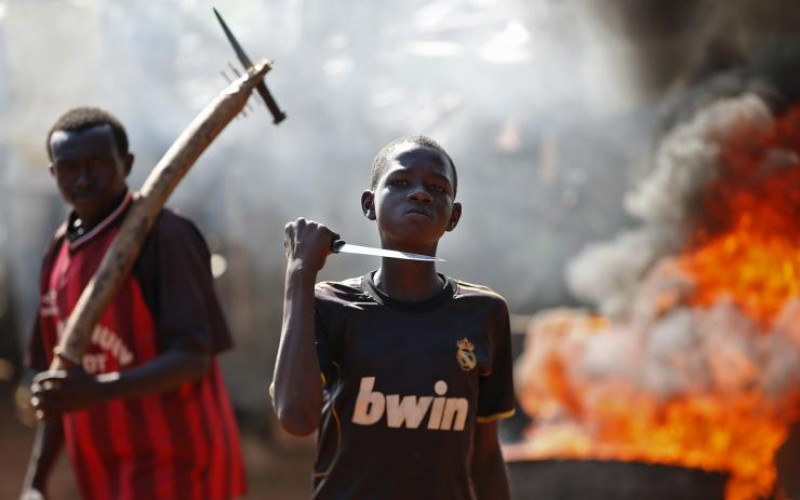The UN Multidimensional Integrated Stabilization Mission in the Central African Republic (MINUSCA) has reported renewed violence this week in the Central African Republic (CAR). On September 16th, after months of relative peace between predominantly Christian anti-Balaka supporters and predominantly Muslim ex-Seleka rebels, 26 civilians were killed, a UN aid worker was injured, and UN humanitarian offices were looted. The violence occurred in and around Kaga Bandoro, a market town 330km North of the capital Bangui. A spokesperson for CAR President Faustin Archange Touadera said that members of the ex-Seleka rebel group “went door to door and killed their victims[,]” including the village chief, and described the execution style killings as “a massacre.”
This recent flare in violence comes after a summer of relative calm in the country, the first since the Seleka uprising began in 2012. Last week at the UN, President Touadera said that “the [CAR] has turned its back on past dark days,” and promised a brighter future based on a four-stage framework for change: peace and security; national reconciliation; economic recovery; and justice and human rights. National reconciliation is to be achieved through a newly established hybrid criminal justice mechanism, the Special Criminal Court (CPS), established to prosecute the Seleka and Anti-Balaka responsible for extreme violence. In this fragile region of the country, renewed violence could stall efforts of the CPS to achieve the second stage of President Touadera’s plan to bring reconciliation to the nation.
In 2012, when Seleka rebels began an assault on the government of President Francois Bozize, the security situation in the CAR began to rapidly devolve. In a matter of months, ethnic violence overcame the country, and the CAR fell into a deepening humanitarian and economic crisis compounded by violence and widespread human rights violations. Following the coup in early 2013, unintegrated Christian militias came together, united under the banner of Anti-Balaka, to resist the rebel power-grab. During the conflict Seleka and Anti-Balaka fighters became engaged in a cycle of tit-for-tat retributive revenge killings. Individuals from both sides are accused of targeting civilians, murder, rape, torture, enlisting child soldiers, destroying humanitarian missions, forcibly displacing civilians, engaging in widespread persecution, looting, and pillaging. In the case of Anti-Balaka, there are also accusations of ethnic cleansing. This conflict resulted an estimated one million refugees and internally displaced persons (IDPs), the rapes of thousands of innocent women and girls, the destruction of humanitarian missions, and the death of thousands of civilians, many of them children.
In January 2014, in order to bring peace to a nation at war, the CAR government established the Transitionary National Council (TNC), approved a new constitution, and replaced coup leader Michael Djotodia with interim president Catherine Samba-Panza. In July 2014, through mediation by the TNC, Seleka and Anti-Balaka leaders signed a peace agreement which formally disbanded the Seleka alliance, and all groups were promised inclusion in the future government. These developments, however, failed to end the violence; ex-Seleka rebels who did not lay down arms, and Anti-Balaka militias, continued to commit grave atrocities throughout the country.
In April 2015, interim president Samba-Panza executed a law creating the CPS. The CPS was created to investigate and prosecute all those responsible for grave human rights violations in the country since former president Bozize took power in 2003. The CPS is the first ‘hybrid justice’ institution created through national legislation to prosecute perpetrators of mass atrocities, and is seen as an inventive and transformative mechanism which possesses the potential to end the cycles of impunity-inspired violence in the CAR. Once the CPS is established it will exist as a special court within the domestic legal system of the CAR, will have a mandate of five years, will be located in Bangui, and will include both CAR citizens and other non-CAR citizens as staff and judiciary. The official mandate of the CPS is to conduct preliminary investigations and judicial examinations, in order to try “all war crimes and crimes against humanity committed on the territory of Central African Republic since 2003.” Despite progress, attacks against civilians remained “alarming and widespread” through early 2016. It was not until late Spring of 2016 when the pinnacle of violence finally passed.
The ultimate success of the CPS in changing the trajectory of the CAR is likely to be determined by specific organizational factors of the court which have yet to be legislated, and future unpredictable events in the country. The CPS is, however, a hybrid justice mechanism like none other before, and is the country’s best chance to end the vicious cycle of impunity for mass atrocities which has plagued it since independence. While President Touadera seeks only brighter days ahead, he also recognizes that despite progress “the situation is a fragile one” and that the CAR “absolutely needs the support of its bilateral and regional partners.” If recent violence in Kaga Bandoro is an indication of, or may become a catalyst for, renewed violence elsewhere in the country there is a risk that it could derail progress towards national reconciliation. MINUSCA is now reinforcing positions in and around Kaga Bandoro and stepping up patrols to protect civilians, and will continue its mandate in the CAR in order to prevent further violence.


